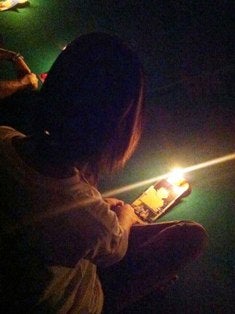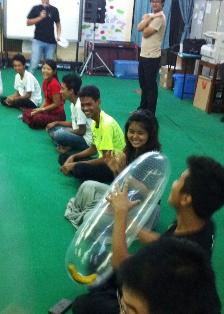Hugs, candle-light testimonials and music. The UNFPA is using unconventional means to reach out to Myanmar youth to increase their knowledge of basic sexual and reproductive health issues and to motivate them to adopt healthier lifestyles.

he pressure on young people to get a good education and get a good job is high and nowhere more so than in Myanmar which is undergoing a massive transformation both politically and socially after decades of military rule. So the pressure felt on Myanmar youth to adopt a healthy lifestyle and do well with their lives is massive.
Many youths end up becoming disillusioned drop out of school, loose contact with their families or even fall victim to drugs, crime and promiscuity. To prevent this, the UNFPA has teamed up with the Myanmar Medical Association to reach out to young people to increase their knowledge of basic sexual and reproductive health and motivate them to adopt healthy lifestyles and be part of a happy family environment. The UNFPA is contributing $150,000 for the youth development programme.
Forty youths in the age group 14-25 year-olds, attend a six-day youth education training programme which is held every month. The programme culminates with a night time candle light ceremony where each participant is placed in front of a lit candle with photos of their loved ones. The room is dark and the only light comes from the 40 lit wax candles. As the session begins a woman’s voice can be heard over a speaker in the background. The voice belongs to Swe Zin Hthike, a famous Myanmar actress.
“Have you ever thought about where you come from? Who brought you into this world and who gave you everything? Who has always stood by and loved you even when you have been disrespectful to them,” the actress says. The voice is soothing as it slowly fills the room. “Have you ever hurt your parents, said awful things to them and never said you were sorry? And yet they still gave you pocket money, cooked and cleaned for you, as well as gave into all demands, even when they were too much? Think about it.”

The purpose of this exercise, which often leads to the release of emotions by participants, is for the young people to realize that regardless of their past actions their families still love and support them and only want the best for them. As the narration comes to an end, music is heard and with the words “Nei Kaun la”, roughly translated means “are you ok”, the light is switched back on, the candles are blown out, and the group replies to the peer educators “Kaun de” or “yes we’re ok”.
“The object of the ceremony is for them to realize that it is possible to stop and change your life, to be a good person, love your family and ultimately be happy. It does not matter what lead you down the wrong path, what matters now is seeing the light and trying again. It is important for them to understand that having supportive parents can help reduce exposure to bad influences coming from outside of the family circle,” said Dr Ne Win, UNFPA’s Assistant Representative and expert on Adolescent, Youth and Reproductive Health.
After the intense candle light session the mood turns from despair to support amid a round of hugs. T-shirts are given out, group photos taken, silly games involving bananas and condoms to the sound of funky tunes take place. All the sadness that filled the room is gone, but not forgotten. The message, as they leave for the day is a new beginning. A fresh start awaits and they embark on hopefully with the aim of a better life and career path.
When asked about the course one of the participants, 18 year-old Win said “When I heard the song I suddenly felt sad inside and I started remembering some of the bad things I had done in the past, especially the way I treated my parents. I will from now on try my best and treat them much better and with respect. When I grow up want to become a designer and painter.”
Most of the graduates of the youth development programme have excelled, and are now returning the favour by becoming volunteer peer-educators themselves. Some have gone on to hold high positions in the government, private sector and some have even become famous actors. “The course is very sought after and we have a long waiting list. We often find that it is the parents that sign their children up to participate in the programme,” concluded Dr. Ne Win.


